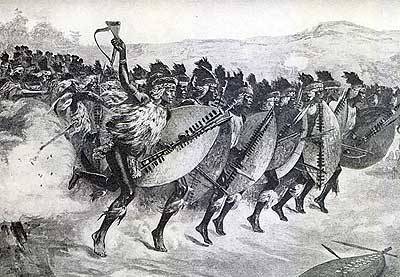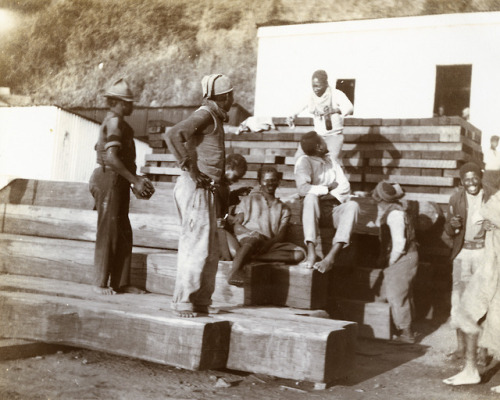#south african history
Portrait of people posing in the H. Moschke Ltd. store in Pietersburg (now Polokwane), South Africa, c. 1900-1910. Published by Detroit Publishing Company.
Source: Library of Congress.
Post link
On This Day In History
May 10th, 1994: Nelson Mandela is inaugurated as South Africa’s first Black president.
March 29th 1879: Battle of Kambula
On this day in 1879, the Battle of Kambula occurred, marking a decisive moment in the Anglo-Zulu War. The war in South Africa began in 1878 after the murder of several British citizens by Zulus and the Zulu king’s refusal to hand over the perpetrators for trial. However, authorities in Britain had long been seeking pretense to launch an assault on the Zulu Kingdom to consolidate British rule in the area. The indigenous Zulu warriors had some initial success against the European invaders, including at the battle of Isandlwana in January 1879, though this victory was offset by defeat at Rourke’s Drift. Wary of the enemy, British forces in the Zulu Kingdom led by Evelyn Wood fortified an area near Kambula. On March 29th the Zulu army launched an attack on the British position, but their advance was halted by a British mounted force. The Zulu forces continued their attack, and 11,000 fighters charged head-on into a hail of British fire. They sustained heavy losses, but the Zulu army successfully exerted pressure on the British stronghold and forced the defenders to retreat. Despite putting up a considerable attack, the Zulu forces were eventually forced to retreat under British fire. The battle was a decisive British victory, with the defenders losing 29 soldiers and the Zulu up to 3,000. Kambula also severely weakened the Zulu forces, allowing the British to ultimately defeat the Zulu and imprison their king in July. British victory spelled the end of the independence of the Zulu nation in South Africa.
Post link
March 21st 1960: Sharpeville massacre
On this day in 1960, police opened fire on peaceful anti-apartheid protestors in the South African township of Sharpeville, killing 69. The over 5,000 strong crowd gathered at Sharpeville police station to protest the discriminatory pass laws, which they claimed were designed to limit their movement in designated white only areas. The laws required all black men and women to carry reference books with their name, tax code and employer details; those found without their book could be arrested and detained. The protest encouraged black South Africans to deliberately leave their pass books at home and present themselves at police stations for arrest, which would crowd prisons and lead to a labour shortage. Despite the protestors’ peaceful and non-violent intentions, police opened fire on the crowd. By the day’s end, 69 people were dead and 180 were wounded. A further 77 were arrested and questioned, though no police officer involved in the massacre was ever convicted as the government relieved all officials of any responsibility. The apartheid government responded to the massacre by banning public meetings, outlawing the African National Congress (ANC) and declaring a state of emergency. The incident convinced anti-apartheid leader and ANC member Nelson Mandela to abandon non-violence and organise paramilitary groups to fight the racist system of apartheid. In 1996, 36 years later, then President Mandela chose Sharpeville as the site at which he signed into law the country’s new post-apartheid constitution.
“People were running in all directions, some couldn’t believe that people had been shot, they thought they had heard firecrackers. Only when they saw the blood and dead people, did they see that the police meant business”
- Tom Petrus, eyewitness to the Sharpeville massacre
Post link

“Jochen Arndt’s path-breaking study, Divided by the Word, examines how the South African languages, isiXhosa and isiZulu, have come into being. Meticulously researched and drawing on a rich array of rarely used primary sources, Arndt shows how the boundaries of these languages and ethnic identities were constantly shaped and reshaped over the centuries by a host of actors: European missionaries and mission rivalries, African interpreters and translators, black and white intellectuals, educators, and apartheid ideologues. Clearly written, this book is a must-read for historians and analysts of contemporary South African developments.”




